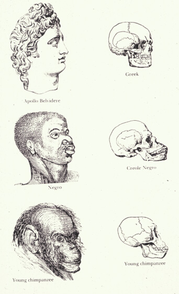 Scientific racism. Scientific racism. One of the most devastating effects of ongoing trauma, especially the society-wide traumas of oppression and war, is that it becomes normalized to the point that it begins to seem inevitable, natural, and those who insist otherwise come to be seen as naive. Of course there are vested interests in making it appear that it's human nature to slaughter each other for control of land, water, oil, just as slaveholders made elaborate pseudoscientific arguments for enslavement as part of the natural order of things. 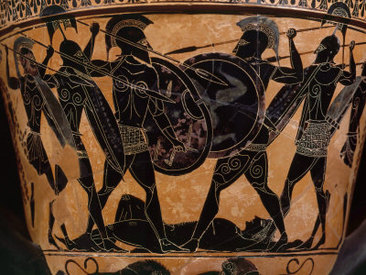 Trojan wars. Trojan wars. Even progressive people who see war as rooted in greed, tend to assume that under duress, people will inevitably fight over resources. There is a strong current of belief in the need to patrol our inherent savagery, containing it by constructing consciously civilizing cultures. But it turns out we're more closely related to the make-love-not-war bonobos, than to the more aggressive chimps, long trotted out to prove that we can't help bashing each other over the head. And now, Rutgers anthropologist Brian Ferguson has released an in depth survey of archeological sites from all over Europe and the region currently known as the Middle East, showing that warfare, far from being deeply rooted in our evolutionary makeup, is relatively new. “The Western world’s first widespread, enduring social system of war” seems to have appeared for the first time roughly 8,000 years ago in Anatolia, which included the ancient city of Troy. 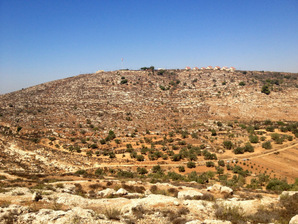 Qaryout,Palestine. Photo by James Knoop Qaryout,Palestine. Photo by James Knoop More startling and poignant is the story of the Southern Levant, which includes the modern states of Syria, Jordan, Israel and Palestine. In a Scientific American article, science writer John Horgan summarizes, "...hunter gatherers started settling in the Southern Levant 15,000 years ago, and populations surged after the emergence of agriculture there 11,000 years ago. But there is no significant evidence of warfare in the Southern Levant until about 5,500 years ago, when the region increasingly came under the influence of the emerging military empire of Egypt, according to Ferguson. In other words, humans lived and thrived in the Southern Levant for roughly 10,000 years–a period that included population growth, climate shifts and environmental degradation, all of which are thought to be triggers of warfare—without waging war." Somewhere in its dry expanse, the first known farms of the world were planted, tents were pitched and taken down, the first human villages rose among fields and pastures and eroded away, all unfolding for a hundred centuries without war, five hundred generations without soldiers. 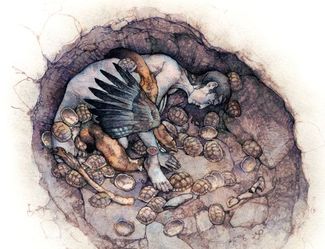 National Geographic illustration by Greg Harlin National Geographic illustration by Greg Harlin In that same land, war has raged for all my life time, and a long time before, supported by narratives of exclusive rights, entitlement by trauma, and the inevitability of bloodshed, that the land cannot, and should not, sustain multiple peoples, that the god of three religions has picked favorites (though Crusaders, Jihadists and Zionists have disagreed on who that is,) that conflict over resources is unavoidable, that it's kill or be killed. Two oppressed peoples, one of them overwhelmingly and violently dominant over the other, slaughter each other over the right to live in that place. And yet, for ten thousand years, through cycles of drought and presumably crop failures and scarcity of game, the people of that land did not kill each other over water, or wild rye, or herds of gazelles. Whatever their response was to the pressures on their survival, it didn't include violence. Nowhere in that long span of time, are there mass graves, shattered skulls, bones pierces with spear points, fortified towns. Instead, there is the 12,000 year old burial site, in what is now northern Israel, of a woman shaman of the Natufian people, her body interred with piles of tortoise shells, and the wing of a golden eagle, a place where her people gathered again and again to feast together. Zooarcheologist Natalie Munro believes the Natufians, the first nomadic people anywhere who are known to have settled into villages, used communal feasting to ease the tensions of living close together. Like the bonobo, they used pleasure and celebration as a tool of reconciliation. 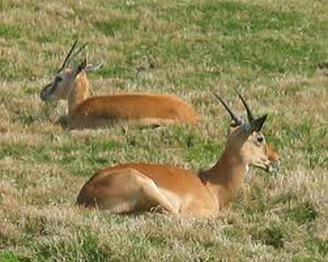 I am not an anthropologist or an archeologist. I am a radical poet in search of stories that reweave the world. Reading about that long and blessed era of peaceful coexistence, in a place that has become symbolic of entrenched and bloody fighting and permanently competing interests, I imagine an entirely different legacy. There is another possibility, another way to be, rooted in that same desert, those same sweet springs and groves, the same forested hills, wild grasses and leaping gazelles, the same deep river. Not a nationalistic God who deeds the land to one small band among many, encouraging its members to grab it from those who already live there, not a ferocious combat requiring winners and losers, not a land scarred with borders, walls, fences, checkpoints, private roads, hoarded harvests, and diverted streams, but an ancient, hidden inheritance of hope, a secret aquifer of coexistence we could call forth with our cupped hands and our thirst. There was a warless way of life in this very place where homes and lives are daily shattered, for twice as long as all the years since Egypt's military might first appeared on their horizon, among those ancestors of ours who had no weapons, only tools. They practiced it for so long, that the traces must still linger in the stones. We could set aside the property rights of patriarchs, the historically newfangled notions of imperialism, the doctrines of national and tribal security that justify anything in the name of a safety that never arrives, and listen instead for their voices, the people who didn't fight. If we took them for our authority, our teachers, the ones from who we all, city-dwellers and farmers, descend, perhaps we would discover that the holiness of the land springs from them, that they are our prophets, and the place where they dwelt is not anyone's promised land at all, but instead, a place of precedent, a land of infinite and universal promise. Ferguson discusses his research in“The Prehistory of War and Peace in Europe and the Near East,” a chapter in War, Peace, and Human Nature, edited by Douglas Fry (2013, Oxford University Press.)
0 Comments
Your comment will be posted after it is approved.
Leave a Reply. |
About Aurora
Aurora Levins Morales is a disabled and chronically ill, community supported writer, historian, artist and activist. It takes a village to keep her blogs coming. To become part of the village it takes, donate here. Never miss a post!
Click below to add this blog to your favorite RSS reader: Archives
September 2017
Categories
All
|
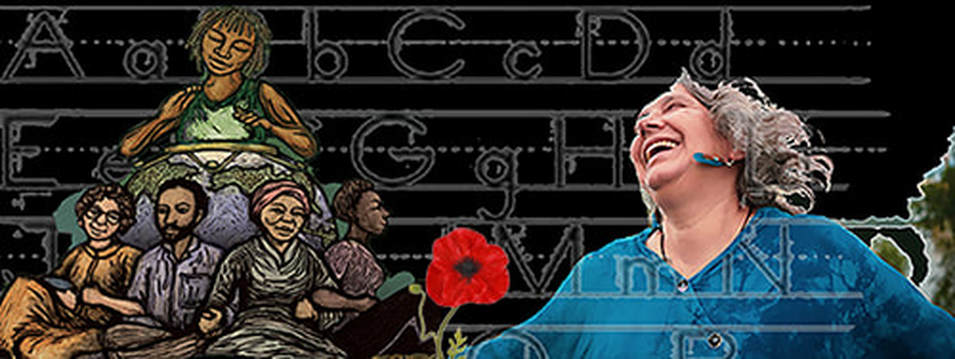
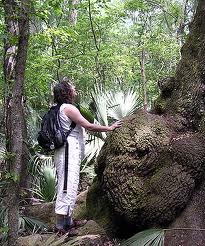
 RSS Feed
RSS Feed
